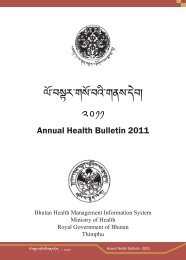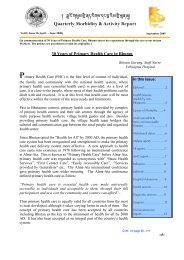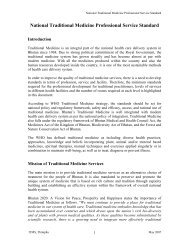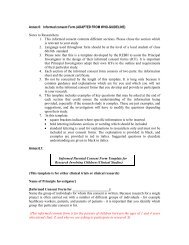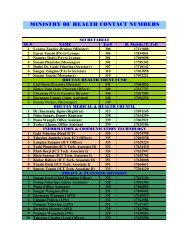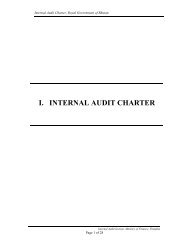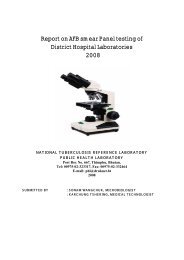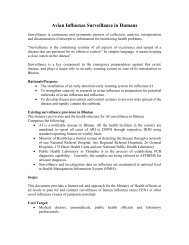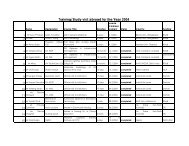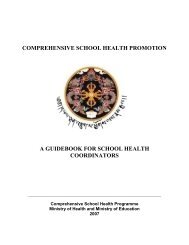ANNUAL HEALTH BULLETIN 2004 - Ministry of Health
ANNUAL HEALTH BULLETIN 2004 - Ministry of Health
ANNUAL HEALTH BULLETIN 2004 - Ministry of Health
Create successful ePaper yourself
Turn your PDF publications into a flip-book with our unique Google optimized e-Paper software.
The integration <strong>of</strong> Community Based Rehabilitation (CBR) programme within the PHe<br />
was commenced in 1997 (8th FYP) with assistance from WHO. The Community Based<br />
Rehabilitation (CBR) Programme was initiated as a pilot programme in Khaling Geog,<br />
Trashigang Dzongkhag, using the infrastructure <strong>of</strong> the primary health care system for<br />
service delivery. This was aimed at identifying the challenges to include rehabilitation<br />
as the fourth major component <strong>of</strong> Primary <strong>Health</strong> Care. With the experience gained in<br />
the Khaling pilot programme, the CBR activities were gradually extended to other<br />
dzongkhags.<br />
Surveys carried out in the pilot CBR Programme and household surveys in Bhutan have<br />
estimated disability at 3.5%. These figures are only suggestive and are not definitive. A<br />
more detailed survey <strong>of</strong> the different regions may be necessary to correctly assess the<br />
extent and degree <strong>of</strong> disabilities and their causes, which will be carried out soon.<br />
However, the pilot survey has highlighted the fact that people with speech and hearing<br />
problems constitute the highest percentage <strong>of</strong> the disabled population, followed by<br />
those with visual impairment.<br />
People with disabilities are <strong>of</strong>ten more severely affected by and exposed to, hardships<br />
and discrimination than other community members. The most common needs expressed<br />
by people with disabilities are for functional skills in daily life activities (self care,<br />
mobility, behaviour), educational needs (schooling, vocational training) and needs for<br />
information about their disability. Another major concern <strong>of</strong> people with disabilities is<br />
the need for income generating activities.<br />
In Bhutan, many superstitions and misconceptions about disabilIty continue to be<br />
prevalent. Services for early identification and intervention to prevent the progression<br />
<strong>of</strong> impairments and disabilities are insufficient, as also the facilities for medical<br />
rehabilitation, education, awareness, and employment generation. The terrain in the<br />
country is another challenge for delivery <strong>of</strong> rehabilitation services.<br />
However, the pilot Programme has also highlighted the fact that the goals <strong>of</strong> a<br />
community-based programme cannot be achieved only through the interventions <strong>of</strong> the<br />
health sector. An effort has been made in the pilot phase to form a National Coordination<br />
Committee on' Disability (NCCD) in 1999. Since then, the Ministries <strong>of</strong><br />
Education and Employment has started developing a policy for inclusion <strong>of</strong> people with<br />
disabilities along with the mainstream <strong>of</strong> Bhutanese population in reaslising the<br />
development philosophy <strong>of</strong> Gross National Happiness (GNH).




